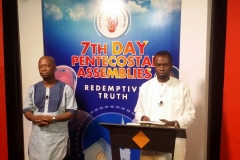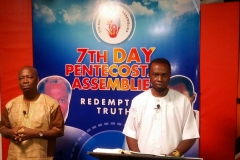From Faith to Faith
By:Elder Enoch Ofori Jnr
(Sabbath, 12th November, 2011)
The Gospel, God’s Power for Salvation
In Romans 1 the Apostle Paul is bubbling with joy at the prospect of visiting the brethren in Rome to “impart to them some spiritual gift”, and his rejoicing is well founded because of what the Gospel of Christ is and does: ” … I am not ashamed of the gospel of Christ: for it is the power of God unto salvation to every one that believeth; to the Jew first, and also to the Greek.
For therein is the righteousness of God revealed from faith to faith: as it is written, ‘The just shall live by faith'” (Rom. 1:16-17).
In this brief passage, the Apostle unlocks the secret of triumphant Christian living. The Gospel of Christ is the power of God bringing salvation to every believer in a permanent sustainable manner whereby the righteousness of God manifested in the believer is maintained on the basis of faith and faith alone!
‘Nothing Good Dwells in Me’
The scripture in Romans 1:17, as many tend to misinterpret it, does not mean obedience has no place in the Christian life. Elsewhere in the Book of Romans Paul mentions “the obedience of faith” (1:5; 16:26), showing that faith and obedience are not mutually exclusive or antithetical. Indeed, faith should logically lead to obedience, as Abraham demonstrated when he “through faith” “obeyed” God’s command to leave His father’s house for a land “I will show thee” (Heb. 11:8).
Therefore what Rom. 1:17 is telling us is that it takes faith to come to Jesus the Messiah (at which repentance and conversion is effected), and it takes faith to maintain one’s righteous life in Him thereafter. This was what ancient Israel failed to realize and hence never attained true righteousness before God. Notice what God tells us in Ezekiel 33:13: “When I shall say to the righteous that he shall surely live; if he trusts in his own righteousness and commits iniquity, all his righteous deeds shall not be remembered; but for his iniquity that he has committed, he shall die for it”.
It’s a curious turn of events. The righteous is supposed to do righteousness but in doing so, he must not trust in “his own righteousness” or he will not be able to sustain his life of righteousness but surely commit lawlessness along the way and perish! What accounts for this?
The warning to the righteous not to trust in “his own righteousness” is not a call on him to stop doing righteousness which God demands of His people; it’s a warning not to trust in his own inherent goodness which simply doesn’t exist apart from Christ. The Apostle Paul confesses the helpless degenerate state of unregenerate humanity: “For I know that in me (that is, in my flesh,) dwelleth no good thing” (Rom. 7:18).
Against this background, it’s really futile to strive to do righteousness by one’s own efforts. Proverbs 28:26 puts it bluntly: “He who trusts in his own heart is a fool; but whoever walks wisely, he shall be delivered”. Under the circumstances, the wise thing to do is to cling by faith to the God-Man who alone lived a perfect, sinless life on earth and is capable of bringing you to a perfect state of holiness (Heb. 2:16-18, 4:15; 1 Pet. 2:21-24; 1 John 2:28-29, 3:7, 9). He’s “the power and wisdom of God” (1 Cor. 1:24).
“I will cause You to Walk in My Law”
In the latter part of Romans 9, Paul examines Israel’s failure to keep God’s righteousness and concludes that what is to blame is their human-led effort to keep God’s righteousness instead of pursuing it by faith:
“What shall we say then? That the Gentiles, which followed not after righteousness, have attained to righteousness, even the righteousness which is of faith.
“But Israel, which followed after the law of righteousness, hath not attained to the law of righteousness.
“Wherefore? Because they sought it not by faith, but as it were by the works of the law. For they stumbled at that stumblingstone;
“As it is written, Behold, I lay in Zion a stumblingstone and rock of offence: and whosoever believeth on Him shall not be ashamed” (vv. 30-33).
Here, the Apostle hit the nail right on the head. The unbelieving Jews tried to follow the righteous law of God they had been taught, knew and might even have memorized, but still failed to keep its righteous requirements, not because the law was evil (see Rom. 7:7, 12) but because they tried keeping the law by their own ritualistic efforts, not on the basis of faith in the Messiah who keeps all those who trust Him from coming to shame because He’s well able to ensure that they never fall short. Thus the irony is that while Gentile believers, who traditionally did not know the righteous law of God (Eph. 2:11-12, 4:17-19), have fulfilled the righteous demands of the law because they did not seek God’s righteousness by their own efforts but by faith in Christ, Israel has not because of their rejection of Christ–a stumbling-block and a rock of offence to all who refuse to believe in Him (1 Pet. 2:6-8).
Dear one, blind religious ritualism has no inherent power to keep you righteous before God, and your own personal effort is even feebler. So then, regularly attending church, joining in corporate prayer and worship are all important observances the Bible commands, but they cannot in themselves make you holy in the sight of God if your focus is not on Christ. This explains why some supposedly ‘strong’ believers in the church fall along the way and people find it difficult to understand it. For all you know, all his ‘spirituality’ might have been for show!
The only way to produce the fruit of enduring righteousness is continual trust in the Messiah, a point Israel missed causing perennial pain to the Apostle Paul:
“Brothers, my heart’s desire and prayer to God about the Jews is that they would be saved.
“For I can testify on their behalf that they have a zeal for God, but it is not in keeping with full knowledge.
“For they are ignorant of the righteousness that comes from God while they try to establish their own, and they have not submitted to God’s means to attain righteousness.
“For the Messiah is the culmination of the Law as far as righteousness is concerned for everyone who believes” (Rom. 10:1-4 International Standard Version ISV).
Religious “zeal” or fervour’, even if heartfelt, is not enough to achieve righteousness. In fact, any other method adopted to attain righteousness apart from what God Himself has prescribed, that’s through faith in His Son, is a rebellion against the means He has established for attainment of righteousness. This is because Christ is the One to whom the Law points “as far as righteousness is concerned” to everyone who believes.
The phrase “the culmination of the Law” is rendered “the end of the law” in the KJV and many other versions of the Bible. But the Greek term “telos” (Strong’s #5056) does mean more than ‘end’ in its sense of termination and frequently means ‘goal or purpose’ , ‘the point aimed at’ or ‘result’. Thus Paul’s argument is that without Christ it’s impossible to attain the goal of the law of God which is a life of righteousness. Hence to achieve such goal the law points to Christ as the One able to make men fulfill the righteousness of God found in His law (Rom. 8:3-4; see Ps 119:172; Rom. 7:12).
This is the whole purpose the New Testament spiritual worship—God Himself empowering us to do His will as revealed in prophecy to Ezekiel:
“I will sprinkle clean water on you, and you shall be clean from all your uncleannesses, and from all your idols I will cleanse you.
“And I will give you a new heart, and a new spirit I will put within you. And I will remove the heart of stone from your flesh and give you a heart of flesh.
“And I will put My Spirit within you, and cause you to walk in My statutes and be careful to obey My rules” (Ezek. 36:25-27 ESV).
Writing to the Corinthian believers Paul failed not to emphasize this same veritable truth: it’s God “who has made us competent to be ministers of a new covenant, not of the letter but of the Spirit. For the letter [which men attempt to keep by their vain human efforts] kills, but the Spirit [generating obedience] gives life” (2 Cor. 3:5-6 ESV).
Christ is Able to Keep us from Falling
The contrast is clear: human weakness is all too apparent in the face of righteousness; for Christ, however, righteousness is “the sceptre of His kingdom” and “the girdle of His loins” (Heb. 1:8; Isa. 11:5). He came so that unrighteous, sinful men might become righteous–and stay as such! Unless we relinquish our trust in Him, He’s ABLE to keep us from falling, and to present us faultless before the presence of His glory with exceeding joy (Jude 1:24).
He says in John 10:27-29:
“My sheep hear My voice, and I know them, and they follow Me:
“And I give unto them eternal life; and they shall never perish, neither shall any man pluck them out of My hand.
“My Father, which gave them Me, is greater than all; and no man is able to pluck them out of My Father’s hand”.
It’s a double-layered divine insurance against falling away from salvation for the humble believer (“sheep”) who listens to Christ, the ‘Shepherd’ of his soul, and follows Him. The Saviour’s assurance is that such a believer “shall never perish” because no man or power can snatch him or her from His hand of salvation nor from the hand of His Father, who is “greater than all”!
It’s an infinitely deadly mistake, therefore, to believe or rely on one’s own self for salvation! The Lord Jesus Christ is “the True Vine” on whom we, the branches, depend for continual spiritual growth and survival; without Him “we can do nothing” (John 15:4-5) at every stage of our Christian life, that is from the beginning of our calling to its perfection at His coming (Phil. 1:6). Indeed, from conversion to ascension, Christ is our power for continuing righteousness. Paul puts it beautifully in Galatians 2:20: “I am crucified with Christ: nevertheless I live; yet not I, but Christ liveth in me: and the life which I now live in the flesh I live by the faith of the Son of God, who loved me, and gave Himself for me”.
Now, does Christ keep us from falling?
First, as our High Priest, He knows our vulnerability to sin and so is ready to plead for us and pardon us when we are caught in sin (not when we sin wilfully after knowing the truth, Heb. 10:26) and we confess to Him and ask for His pardon (Heb. 2:16-18; cp 5:1-2; Jam. 3:2). According to 1 John 2:1, Christ, the Righteous, is the One who pleads with the Father on our behalf.
A highly effective mediator, He is able to successfully reconcile us to God when He takes up our plea with the Father. Hence Heb. 7:25 says, “He is able also to save them to the uttermost [‘the very end’ YLT] that come unto God by Him, seeing He ever liveth to make intercession for them” (cp. 1 Tim. 2:5).
Another effective way by which He keeps us firm in the holy faith is that He produces in us the fruit of righteousness as an imprint of our spiritual rebirth into the very character of God, hence we’re His ‘children’ (Rom. 8:14; 1 John 2:29, 3:9; Ezek. 36:26-27).
Considering that our fall or steadfast holiness depends on whether we give up trust in Christ or maintain faith in His sustaining power of righteousness means we need to make prayer a habit. Such a habit of prayer ensures that we, not only keep in touch with the Lord, but are ‘strengthened by His Spirit in the inner man’—the seat of both spiritual and physical stimuli, decisions and actions (Eph. 3:16).
And it’s a never-ending renewal. We must be continually renewed by the Holy Spirit as stated in Titus. 3:5-6: “He saved us, not because of works done by us in righteousness, but according to His own mercy, by the washing of regeneration and renewal of the Holy Spirit, whom He poured out on us richly through Jesus Christ our Savior” (ESV).
Note, the baptized believer regenerated at conversion is continually renewed in the faith and in the work of righteousness by the Holy Spirit poured out on him! Just as His faithfulness is fresh every morning (Lam. 3:22-23), so His Spirit constantly empowers us anew for the doing of His perfect will.
Again, this makes prayer an indispensable tool in the life of the believer who is continually reliant on Jesus, more so at this last hour when so many ungodly lifestyles, hardships and temptations assail our faith. The Lord warned us in Luke 21:34-36:
“But watch yourselves lest your hearts be weighed down with dissipation and drunkenness and cares of this life, and that day come upon you suddenly like a trap.
“For it will come upon all who dwell on the face of the whole earth.
“But stay awake at all times, praying that you may have strength to escape all these things that are going to take place, and to stand before the Son of Man” (ESV; see also 1Thess 5:1-7, 17).
Assuredly, believers of the last hour stand in need of heavenly strength or no flesh shall be saved, as Jesus discloses in another eschatological discourse in Matt 24:22.
His return is as sure as day and night—even if He delays. But the question is, ‘will you be in the number’ as the old song goes? Not if you fail to maintain your righteous life by faith in Christ. To wit, “the just shall live by faith’. But if you draw back of your own accord to pernicious ways, His soul (holy being) will so abhor you that your precious soul will be endangered. There’s a better ending, however. Be one who does not draw back but believes in Christ consistently to the saving of your soul.
The wonderful text that both warns and encourages us in this way is Heb. 10:37-39:
“For yet a little while, and He that shall come will come, and will not tarry.
“Now the just shall live by faith: but if any man draw back, My soul shall have no pleasure in him.
“But we are not of them who draw back unto perdition; but of them that believe to the saving of the soul” (cp. Matt. 24:13).
Given the certainty of His coming, why not do a simple check of yourself before it’s too late?
Let it be an honest introspection: Do you feel lately that you are spiritually weak? Do you find it tedious to do righteousness? Is prayer, along with fasting, etc, becoming a boring chore to you?
It’s a sign that your personal effort and strength is at the centre of your spiritual life, and it is under strain. Without living faith in Christ, the truth is, you will overreach yourself to please God but in vain. The solution is therefore to put Christ at the centre of your spiritual life, and you will never fall. While you must “work out your own salvation with fear and trembling”, you must realize that “it is God who works in you, both to will and to work for His good pleasure” (Phil. 2:12-13 RV, ESV). It’s only when Christ strengthens you that you are ABLE to do “ALL THINGS” (Phil. 4:13).
His promise never fails. If you continue to put your unyielding trust in Him, He’ll surely bring you to glory (Heb. 2:10). At the ‘zero-hour’ when ‘the day of salvation’ gives way to a time of judgment in response to the vow of the mighty angel from heaven that “there should be time no more” (Rev. 10:5-7), you’ll definitely be one of those you will be ‘righteous still’ (Rev. 22:11). Halleluiah!



